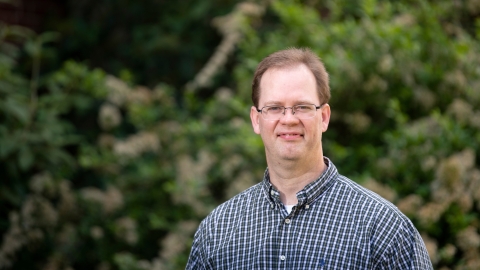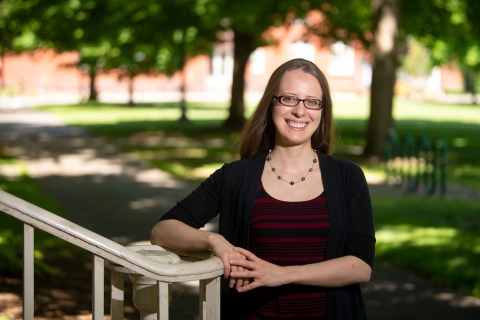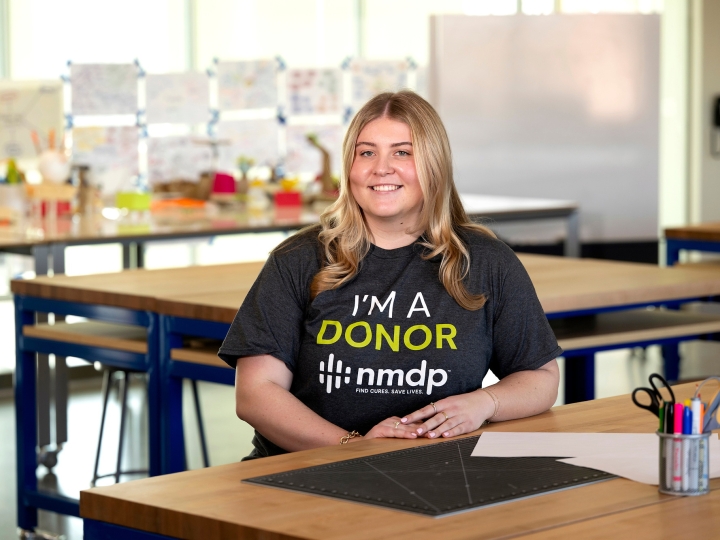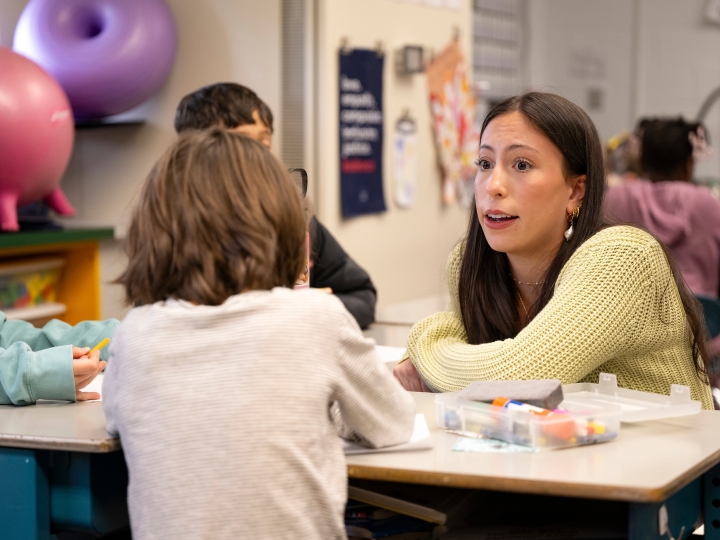
National Science Foundation Grants to Fuel Student-Faculty Exploration
June 16, 2020
Professor Robert Stockland, chemistry, is one of two Bucknell professors who received National Science Foundation grants this spring. Professor Kelly Bickel, mathematics, is the other. Emily Paine, Communications
Professor Robert Stockland, chemistry, admits he's no expert in Earth-abundant metals, a category of elements that are easily found in the planet's crust. But having won three research grants from the National Science Foundation during his Bucknell tenure, Stockland is also no stranger to experimentation and discovery. Equipped with $185,000 from his most recent NSF grant awarded in March, Stockland is launching a project to develop a new class of chemical reactions utilizing Earth-abundant metals — research that will offer undergraduate students the chance to push the boundaries of science alongside their professor.
Joined by Professor Kelly Bickel, mathematics, Stockland is one of two Bucknell faculty who received NSF grants this spring. Both professors will be working closely with students to navigate uncharted territory in their respective fields.
For Stockland, exploring metal-catalyzed reactions could have a significant impact on the design of new and existing pharmaceuticals. Nearly 90% of all pharmaceuticals, he says, are produced through catalytic processes, many involving precious metals like platinum and rhodium. These metals are not only expensive but are also typically found outside of the U.S. (The largest deposits of platinum on the planet are in Russia and South Africa.) Combining easily accessible Earth-abundant metals like iron and nickel will hopefully create catalysts that mimic the reactions of precious metals and produce higher-quality results.
"The ultimate goal is to replace rare and precious metals with these new compounds that have enhanced activity, stability and reactivity," Stockland says. "It's really all about organic chemistry, which is what I specialize in. Only we're using inorganic compounds to accomplish things that organic chemistry can't on its own."
It's an exciting experimental space for Stockland, whose expertise has been primarily in precious metal chemistry. For the student researchers who will be spending the next few summers working on the project, Stockland wants the process of trying, failing and discovering to be more important than getting it right on their first try.
"They'll have to learn how to use new techniques and analyze data differently," he says. "But it will be an invaluable experience because this is what you do in real life. You don't memorize reactions or plug numbers in calculators to get the right answer — you've got to iteratively figure out where to go next when what you've been doing doesn't work."
Exploring Complex Problems
Those nimble and patient problem-solving skills are what Kelly Bickel, mathematics, also hopes to help students cultivate through her own NSF-funded project that begins this June.
Bickel's work lies at the intersection of complex analysis and operator theory. Using complex functions, she aims to solve special cases of Crouzeix's conjecture, an open problem in the operator theory field of mathematics, as well as quantify the behavior of functions near points outside of their domain. The nearly $120,000 grant will not only allow Bickel to travel across the U.S. and internationally to work with faculty collaborators at other universities, but will also fund up to two students to do research at Bucknell over the summer.
"Math is very collaborative, so it's really important to have more than one person involved to bounce ideas off of each other and work through challenges together," says Bickel, who hopes to incorporate even more students into her work through Bucknell's own undergraduate research program.

Bickel's $120,000 grant will fund up to two students to do research at Bucknell over the summer. Emily Paine, Communications
For students with experience in calculus and linear algebra, the project is especially accessible "because they can generate these functions, plot them on a graph and start to recognize patterns," Bickel explains. But that's not to say the work is simple. Exploring intricate math problems like Crouzeix's conjecture is a challenging process of trial and error — one that Bickel likens to the beginning stages of drawing a picture.
"You have a general outline but will inevitably need to erase the parts that don't work and try again. Over time, the image starts to look more clear as you fill in the details until you have something that mimics reality," she says. "The importance of the mathematics isn't getting the right answer — it's the process of trying out different tools to come to a solution," she adds.
Like Stockland, Bickel hopes that her research will give students the opportunity to sit with an engaging problem, think it through deeply and trust themselves to find a meaningful solution.

